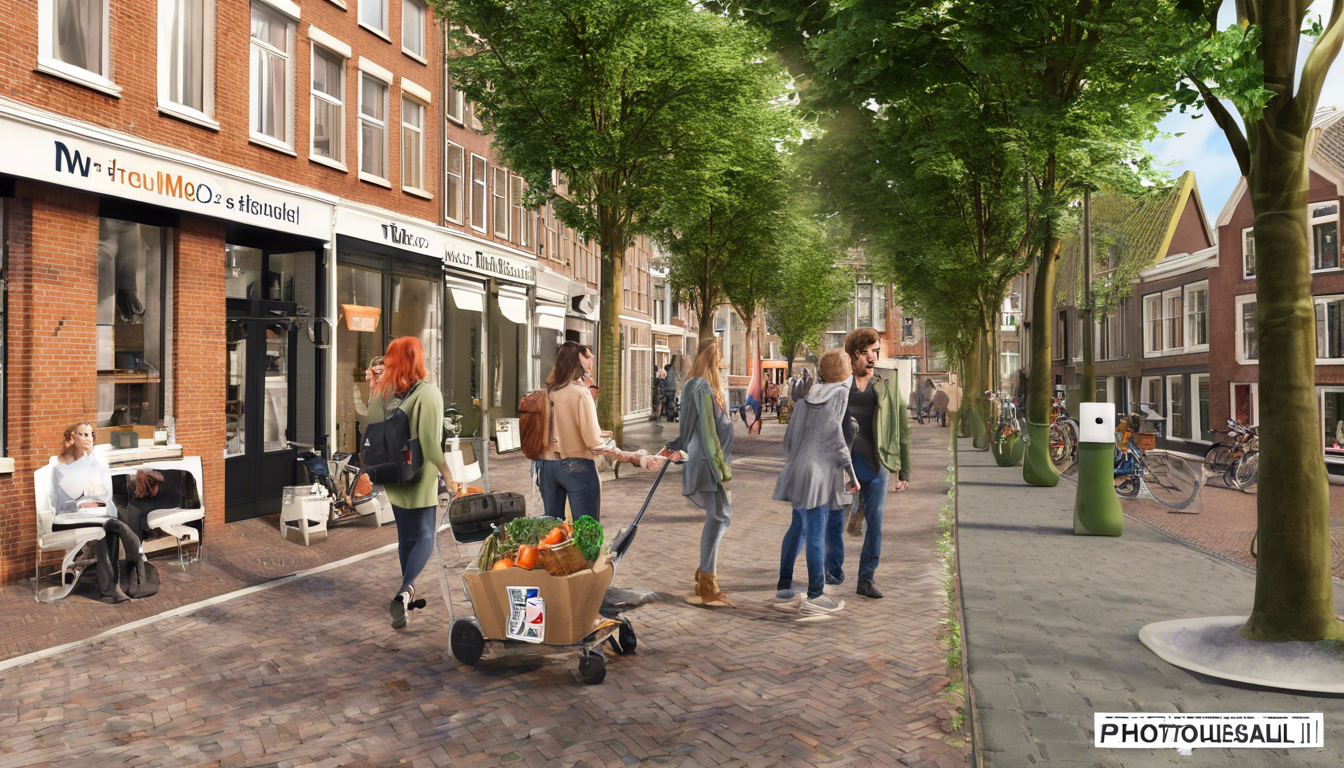How To Move To The Netherlands: A Step-by-Step Guide

Step-by-Step Process for Moving to the Netherlands
Moving to the Netherlands can be an exciting adventure filled with new experiences and opportunities. Whether you’re seeking a fresh start, pursuing a job, or enjoying the vibrant culture, a well-planned approach can make your transition smoother. Here’s a step-by-step process to help you navigate the specifics of relocating to this beautiful country.
Research and Prepare
Before you make any decisions, it’s crucial to gather information. Explore the country’s culture, weather, and lifestyle. Understanding what life is like in the Netherlands will help you adjust more easily once you arrive. Consider these points:
- Cultural Awareness: Familiarize yourself with Dutch customs, traditions, and social norms. This knowledge will help you integrate more smoothly.
- Cost of Living: Research housing, transportation, and everyday expenses in various cities. Amsterdam may be more expensive, while places like Utrecht or Groningen might offer more affordability.
- Language: While many Dutch people speak English, learning some basic Dutch phrases will improve your experience and help you connect with locals.
Validate Your Reasons for Moving
Clarify your motivations for moving. Are you relocating for work, studying, or other personal reasons? This will determine certain aspects such as visa requirements and housing options. Make a list of your goals to stay focused throughout the moving process.
Secure Your Visa
Once you’ve established your purpose, the next step is securing your residence permit or visa. The type you need depends on your nationality and reason for relocation. If you’re an EU/EEA citizen, the process is generally straightforward. For non-EU citizens, follow these steps:
- Determine the type of visa: Find out which visa aligns with your situation, whether it’s for work, education, or family reunification.
- Prepare documentation: Gather necessary paperwork, such as employment contracts, proof of financial means, and health insurance.
- Submit your application: Apply at the Dutch consulate or embassy in your home country or directly in the Netherlands if you’re already there.
Find a Place to Live
Finding the right accommodation is essential. Explore various neighborhoods and check housing websites. Keep these tips in mind:
- Research neighborhoods: Consider proximity to your work or school, public transport accessibility, and local amenities.
- Temporary housing: If you don’t have a permanent place before you arrive, look for temporary options like Airbnb or hostels.
- Rental processes: Understand the local rental practices, including contracts, deposits, and tenant rights.
Set Up Your Utilities
Once you’ve secured your accommodation, it’s time to set up essential services. This typically includes:
- Internet and phone: Research providers in your area to find the best deals.
- Electricity and water: Register with local utilities and set up billing.
- Insurance: Obtain renter’s insurance to protect your belongings.
Register with Local Authorities
You are required to register with your local municipality (gemeente) within a few days of your arrival. This registration is crucial as it allows you to:
- Receive your BSN: The Burgerservicenummer (BSN) is essential for employment, healthcare, and access to public services.
- Settle into the community: By registering, you’ll become part of the local system and access necessary services.
Settle In and Make Connections
Your journey doesn’t end with the paperwork! Take time to explore your new environment. Here are ways to connect:
- Join local communities: Participate in community events or join clubs and groups that interest you.
- Explore the culture: Visit museums, attend festivals, and try local foods to immerse yourself in Dutch life.
- Meet locals: Use social media and apps to meet new friends and expand your network.
Following these steps will help make your transition to the Netherlands smooth and organized. Embrace the change and enjoy all that this beautiful country has to offer!
Essential Documents and Visas Needed for Relocation
Relocating to a new country can be a thrilling journey, but it requires careful planning, especially when it comes to gathering essential documents and securing the right visas. If you’re thinking about moving to the Netherlands, understanding the necessary documentation is paramount to ensure a smooth transition. Here’s a detailed overview of what you need to bring this plan to life.
Understanding Types of Visas
Before you embark on your Dutch adventure, it’s vital to know which type of visa applies to you. Here are the most common options:
- Short-Stay Visa (Schengen Visa): Ideal for those planning to stay in the Netherlands for up to 90 days. This could be for tourism, family visits, or business purposes.
- Long-Stay Visa (MVV): Necessary for those who wish to stay for over 90 days. This is often the first step towards obtaining a residence permit.
- Residence Permit: Required for anyone planning to live in the Netherlands for more than 90 days. Different permits cater to various reasons such as work, study, or family reunification.
Essential Documents for Visa Application
Gathering the right documents can seem overwhelming, but it’s manageable with a checklist. Here’s what you typically need:
- Valid Passport: Your passport should be valid for at least three months beyond your planned departure date from the Netherlands.
- Visa Application Form: Complete the appropriate visa application form, which varies based on the type of visa you are applying for.
- Passport Photographs: Ensure that you provide recent, identical passport-sized photos that meet the Dutch requirements.
- Proof of Financial Means: Demonstrate that you can sustain yourself financially during your stay, such as bank statements or proof of income.
- Health Insurance Coverage: It’s essential to have valid health insurance that covers your stay in the Netherlands.
- Accommodation Proof: This could be a rental agreement or a letter from a host indicating where you will be staying.
Additional Documents Depending on Your Visa Type
Your visa type may require additional documentation. Here are some specific cases:
For Work Visa
If you’re moving for employment, you will need:
- A job offer or employment contract from a Dutch employer.
- Proof of your qualifications, such as diplomas or professional certificates.
- Letter from your employer explaining why you are needed for the position.
For Study Visa
Planning to study in the Netherlands? You will require:
- An acceptance letter from a recognized Dutch educational institution.
- Proof of sufficient funds to cover your tuition and living expenses.
For Family Reunification
If you’re joining a family member already in the Netherlands, ensure you have:
- Proof of your relationship, such as a marriage or birth certificate.
- Evidence that the family member is legally residing in the Netherlands.
The Application Process
After gathering the necessary documents, your next step is to submit your application. Depending on your location, you’ll typically apply either:
- At the Dutch embassy or consulate: This is common for applicants outside the Netherlands. Book an appointment and submit your documents in person.
- At the Dutch Immigration and Naturalization Service (IND): If you’re already in the Netherlands, this is usually where you’ll submit your application.
Processing Time and Fees
Understanding the processing time and fees associated with your visa application is crucial. Typically, processing can take anywhere from a few weeks to several months, depending on the visa type. Ensure that you pay any required fees online and keep records of your payments.
Remember to keep copies of all your documents and correspondence throughout this process. Being well-prepared can make the experience less stressful and help you enjoy your new adventure in the Netherlands.
Finding Housing: Tips and Resources in the Netherlands
Moving to a new country can be both exciting and challenging, and one of the significant hurdles you’ll face is finding appropriate housing in the Netherlands. Whether you’re relocating for work, school, or adventure, having a safe and comfortable place to live is crucial. Here are some tips and resources to help you navigate the housing market effectively.
Understanding the Housing Market
Before diving into your search, it’s important to understand the Dutch housing market. The demand for housing in urban areas like Amsterdam, Rotterdam, and Utrecht is particularly high. Prices can vary widely based on location, size, and amenities. Researching neighborhoods before relocating can give you a good idea of what to expect concerning rent and lifestyle.
Set Your Budget
Establishing a budget is the first step in your housing search. Consider the following:
- Monthly Rent: Include any additional costs like utilities, internet, and insurance.
- Deposit: Typically, you’ll need to pay a security deposit equal to one or two months’ rent.
- Council Tax: This is a recurring cost you should factor into your budget.
- Potential Housing Agents Fees: If you choose to use an agent, be aware that they may charge a fee.
Use Online Platforms
The internet is your best friend when searching for housing in the Netherlands. Ensure you check the following platforms:
- Funda.nl – A popular site for finding rental and sale properties.
- Pararius.com – This site focuses on rental properties, offering a wide range of options.
- Kamernet.nl – Great for finding rooms and shared accommodation.
- Essentials.nl – A useful site for expats and international students.
Join Local Facebook Groups and Expat Communities
Connecting with locals and expats can provide valuable insights into the housing market. Join groups on social media platforms, such as:
- Expat Life in the Netherlands – A supportive community where members share housing leads.
- Amsterdam Expats – Specific to housing and events in Amsterdam.
These communities often share listings, offer advice, and provide a space to connect with others experiencing similar challenges.
Work with a Real Estate Agent
If you are feeling overwhelmed, consider hiring a real estate agent familiar with the Dutch market. An experienced agent can help you:
- Narrow down your housing options based on your preferences.
- Navigate legal requirements and documentation.
- Negotiate terms with landlords.
Keep in mind that agents usually charge a fee, typically one month’s rent.
Understand Rental Contracts and Rules
Familiarize yourself with the Dutch rental laws to avoid misunderstandings. Here are some key points to keep in mind:
- You will need to sign a rental agreement.
- Most contracts are legally binding, so make sure you understand all terms before signing.
- Notice periods can vary, so clarify your obligations for moving out.
Always ask for translations if the contract is in Dutch to ensure clarity.
Be Ready to Act Quickly
Because housing can move fast in the Netherlands, be prepared to act quickly when you find a suitable place. Have your documents ready, such as:
- Your identification (passport or ID card)
- Proof of income (such as pay slips or an employment contract)
- References from previous landlords, if applicable
Having these documents readily available can give you a competitive edge when securing your next home.
Finding housing in the Netherlands may feel daunting at first, but with a little preparation and the right resources, you can turn your dream of living in this beautiful country into reality. Make sure to assess your options, stay proactive, and engage with the community. Good luck on your journey!
Navigating Healthcare and Insurance After Your Move
After relocating to a new country, one of the most crucial aspects to tackle is understanding the healthcare system and insurance options. If you’ve just moved to the Netherlands, it’s time to navigate this essential aspect of your new life. The Dutch healthcare system is known for its quality, but it can feel daunting at first. Here’s how to get started.
Understanding the Dutch Healthcare System
The Netherlands has a unique and efficient healthcare system characterized by a mandatory health insurance scheme. Every resident must have health insurance to cover basic medical care. Here’s how it works:
- Mandatory Health Insurance: All residents, including expatriates, must obtain basic health insurance.
- Health Insurance Providers: You can choose from numerous private insurers who offer standard coverage.
- Basic Package: This package covers essential medical services, including visits to general practitioners, hospital care, and prescription medications.
Choosing a Health Insurance Plan
When deciding on an insurance provider, consider the following steps:
- Research Different Providers: Take time to compare available health insurance providers. Look for reviews and feedback from current customers.
- Check Coverage Options: Ensure the plan covers your specific needs, such as prescriptions, specialist visits, or additional services like dental and physiotherapy.
- Evaluate Costs: Compare monthly premiums, deductibles, and out-of-pocket costs. You may want to balance cost against the level of coverage provided.
Registering for Health Insurance
Once you select a provider, you need to register for health insurance to fulfill your legal requirement:
- Timeline: You must obtain your insurance within four months of your arrival in the Netherlands.
- Identification: Have necessary documents ready, such as your passport, residence permit, and any previous insurance information.
- Application Process: You can typically apply online through your chosen provider’s website.
Understanding Healthcare Access
After securing your health insurance, familiarize yourself with how to access healthcare services:
- General Practitioner (GP): Your first point of contact for most health issues is a GP. It’s essential to register with one soon after your move. You can find a GP by searching online or asking for recommendations.
- Specialists: To see a specialist, you usually need a referral from your GP.
- Pharmacies: Pharmacies in the Netherlands are well-regulated and offer prescription and over-the-counter medications. Know the nearest pharmacy’s hours and services.
Emergency Care
While adjusting to life in the Netherlands, it’s wise to know the emergency care options available:
- Emergency Number: For emergencies, dial 112 for immediate assistance.
- Hospital Care: If you require urgent treatment, go to the nearest hospital emergency department. Your insurance will likely cover most of the costs, but be aware of deductibles.
Buying Additional Insurance
While basic health insurance covers essential care, consider whether you need additional coverage:
- Dental Insurance: Often not included in basic packages, dental care is essential, especially for families.
- Alternative Therapies: If you believe in holistic or alternative treatments, look for insurers offering these options.
- Travel Insurance: If you plan to travel back home or visit other countries, supplemental travel insurance can protect against unexpected healthcare costs.
Maintaining Your Health
Staying healthy in your new home enhances your overall experience. Make use of preventive care services offered by your health insurance. Routine check-ups can identify potential health issues early on.
Joining local community groups or expat forums can provide vital support and shared experiences. This connection can help you navigate the healthcare system more effectively. By educating yourself about healthcare and obtaining the right insurance, you will be well-equipped to enjoy your life in the Netherlands.
Integrating into Dutch Culture: Customs and Language Tips
Moving to the Netherlands can be an exciting adventure, filled with new experiences and challenges. One of the most rewarding aspects of relocating is integrating into Dutch culture. Understanding local customs and learning the language can help you feel at home more quickly. Here are some essential tips to help you along the way.
Embrace Dutch Customs
The Netherlands is known for its unique culture, which can differ significantly from what you may be used to. By embracing local customs, you’ll make friends and connect with your new community. Here are a few important customs to keep in mind:
- Direct Communication: Dutch people value honesty and straightforwardness. It’s common to speak openly and express your opinion. Don’t be surprised if someone critiques your idea; it’s usually well-intentioned!
- Punctuality: Being on time is crucial in Dutch culture. Whether it’s a casual meet-up or a professional appointment, aim to arrive promptly. This shows respect for others’ time and helps build trust.
- Socializing: The Dutch are friendly but may take time to open up. When you meet someone new, a firm handshake and direct eye contact are standard. Small talk is appreciated but can be brief; focus on getting to know each other better.
- Celebrating Holidays: Familiarize yourself with Dutch holidays such as Sinterklaas, King’s Day, and Liberation Day. Participating in local celebrations can help you feel more integrated into the community.
Understanding Dutch Language Basics
While many Dutch people speak English, learning the language can greatly enhance your experience and help you connect with locals. Start with these tips:
- Focus on Key Phrases: Begin with essential phrases like “Hallo” (Hello), “Dank u wel” (Thank you), and “Waar is…?” (Where is…?). These simple interactions can go a long way in building rapport.
- Classes and Apps: Consider enrolling in a Dutch language class or using language-learning apps. Many resources can help you learn on your own or through structured lessons.
- Practice Regularly: The more you practice, the more confident you’ll become. Try speaking with locals or fellow expats. Don’t worry about making mistakes; it’s part of the learning process.
Engage with the Local Community
Integrating into Dutch culture means actively participating in your community. Here are some effective ways to do just that:
- Join Clubs or Groups: Whether it’s sports, hobbies, or volunteer work, joining a club can be a great way to meet new people and practice your language skills in a fun environment.
- Participate in Local Events: Attend festivals, markets, and community gatherings. These events often showcase Dutch traditions and provide a chance to connect with locals.
- Make Dutch Friends: Building friendships with Dutch natives can help you learn about culture firsthand. Don’t hesitate to ask them questions about customs, food, and lifestyle.
Explore Dutch Cuisine
Food is a vital part of any culture, and the Netherlands has its own unique dishes worth exploring. Trying local foods not only helps you understand Dutch culture but also gives you something to bond over with locals. Here are some popular dishes to try:
- Stroopwafels: A sweet treat made of two waffles filled with caramel syrup.
- Haring: Raw herring fish, typically eaten by holding the fish by the tail and taking a bite.
- Patat: Thick-cut fries often served with a variety of toppings like mayonnaise, ketchup, or satay sauce.
Integrating into Dutch culture is a rewarding journey that involves understanding customs, learning the language, and actively engaging with the local community. Living in the Netherlands offers a unique opportunity to experience a rich culture filled with friendly people and beautiful traditions. As you embrace these aspects, you will find a sense of belonging that makes your new home truly special.
Conclusion
Moving to the Netherlands is an exciting adventure filled with opportunities for growth and new experiences. By following the step-by-step process outlined in this guide, you can make your relocation as smooth as possible. Remember to gather all the essential documents and secure the appropriate visas to ensure a hassle-free entry into your new home.
Finding housing can seem daunting, but utilizing local resources and online platforms will help you discover the perfect place to live. Once settled in, understanding the healthcare system and obtaining the right insurance is crucial for your well-being and peace of mind.
Navigating a new culture is one of the most rewarding aspects of relocating. Embracing Dutch customs and learning the language will not only enrich your experience but also help you form genuine connections with the locals. As you adapt to your new environment, remember to stay open-minded and engaged.
Each step you take towards establishing your life in the Netherlands brings you closer to becoming a part of this vibrant community. With the right preparation and mindset, you’ll find that residing in the Netherlands not only enhances your quality of life but also offers endless opportunities for exploration and personal growth. Enjoy the journey and embrace life in your new Dutch home!





One Comment